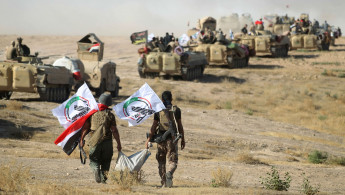Hashd al-Shaabi should be part of Iraqi security forces, says leading Iraqi cleric
Iraqi Shia paramilitary groups that took part in the war against the Islamic State group should not fold but instead be incorporated into the country's state security forces, Grand Ayatollah Ali al-Sistani said on Friday.
Known in English as the Popular Mobilisation Units, the various forces within the Hashd al-Shaabi can field a total of between 60,000 and 140,000 fighters.
The force was established in 2014 after Sistani urged Iraqi citizens to take up arms against IS militants who had swept aside government forces and seized control of much of northern Iraq, threatening the capital Baghdad itself.
"The security apparatus should be supported by the fighters who took part in the war on [IS]," he said.
"It is necessary to absorb the fighters in the official and constitutional structures," Sistani said in the sermon.
He said a fatwa should "not be used to achieve political aims".
The Hashd al-Shaabi is government-sanctioned and under the authority of the prime minister, but not the ministry of defence or army command.
It reality the militias are seen as an independent force, taking orders neither from the Iraqi military of government with critics saying they directly controlled by Iran.
Sistani's position is in line with that of Prime Minister Haider al-Abadi, who wants to prevent commanders from using the power acquired during the war on IS in elections due on 12 May.
Abadi quickly reacted to Sistani's sermon in a statement from his office "welcoming his call against using volunteers and fighters in political campaigning".
Iraq's parliament has classed it as a state force operating within the constitution.
The powerful militia group suffered 7,637 dead and 21,300 wounded in the three-year war to drive out IS, according to a top Hashd al-Shaabi commander, Qais Khazali.
Calls have been growing from the West for the Hashd al-Shaabi to disband, with French President Emmanuel Macron proposing "a gradual demilitarisation" of the group and for all militias in Iraq to be "dismantled".
In Iraq, Sunni and Kurdish politicians have called on Abadi to disarm the militia group, pointing to widespread abuses including extra-judicial killings, kidnappings and displacing non-Shia populations.
Iran provided training and supplied weapons to the most powerful Hashd al-Shaabi groups, including Amiri's Badr Organisation and Khazali's Asaib Ahl al-Haq.





 Follow the Middle East's top stories in English at The New Arab on Google News
Follow the Middle East's top stories in English at The New Arab on Google News


